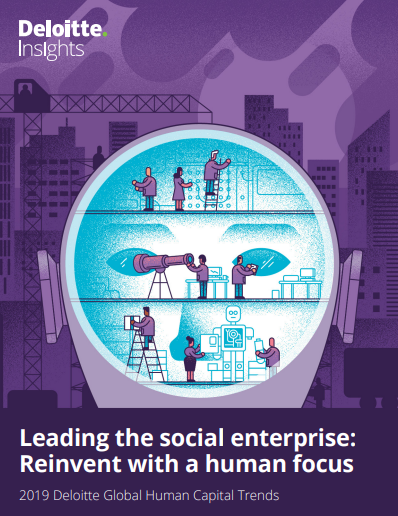2019 Deloitte Global Human Capital Trends
Deloitte’s 2019 Global Human Capital Trends – Leading the social enterprise: Reinvent with a human focus report analyses data collected from nearly 10,000 employees in 119 countries to demonstrate the growth in the importance of social enterprise and to support the positive connection between social enterprise and financial performance.
Some main findings from this report include:
- “Societal Impact” was most often ranked as the top factor to consider when assessing annual performance. A majority of people believed that over time, social enterprise is becoming more crucial to companies.
- Although most of the survey respondents rated learning, human experience and leadership as the most important trends, less than half of the organizations stated that they were ready for these trends.
- IT is not the only function in organizations that uses alternative labor when approximately half of the respondents also reported having utilized alternative arrangements for Operations, Marketing and Innovation. Most of the respondents said that they only managed alternative workforce inconsistently or had few or no processes to manage them and only 8% of surveyed people had developed processes to manage the sources of alternative labor. A majority of respondents agreed that the use of alternative labor is likely to have positive impact on their organization’s performance.
- More than half of the surveyed organizations reported currently using some type of automation. 54% of organizations claimed to have increased investment in reskilling their workforce by at least 6%.
- “Ability to lead through more complexity and ambiguity” was rated as the top new leadership requirement by 81% of the respondents. A majority of people believed that “new technologies” was the reason why there was a difference in the leadership needs for 21st-century leaders.
- When asked to rank how satisfied employees in their organizations with the structure of their jobs, less than half of the respondents thought employees were satisfied or very satisfied. More than half of the respondents believed that their employers were only somewhat effective or not effective at all in engaging employees.
- 65% of respondents stated that most of their work was organized in accordance with hierarchical functional lines, but there is some work that is done in cross-functional teams. More than half of the employees agreed that significant improvement in organizational performance was seen from the shift to a team-based structure. “Individual performance review” was still used as the most common basis for performance rewards.
- More than half of the employees thought that the rewards strategy of their organization was not aligned or only somewhat aligned with the organizational objectives. Many respondents believed that their organizations’ rewards not effectively or only somewhat effectively accommodated the needs of employees. The lack of understanding about important factors to employees and lack of funding were rated as the greatest challenges in changing rewards strategy in organisations.
Deloitte utilizes analysis, data and industry understanding to assist organizations to develop and implement the human resources, recruitment, leadership and change strategies that enhance business performance through people performance.
Full report here.
